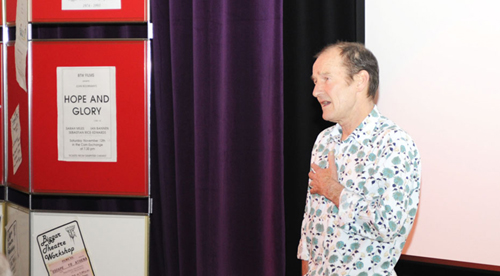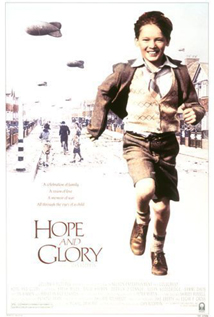| Film
Cast |
|
| Sebastian
Rice-Edwards |
Bill
Rohan |
| David
Hayman |
Clive Rohan |
| Sarah
Miles |
Grace
Rohan |
| Derrick
O'Connor |
Mac |
| Susan
Wooldridge |
Molly |
| Sammi
Davis |
Dawn
Rohan |
| Ian
Bannen |
George |
| Jean-Marc
Barr |
Cpl.
Bruce Carey |
| Anne
Leon |
Bill's
Grandmother |
| Directed
by |
John
Boorman |
| Produced
by |
John
Boorman, Michael Dryhurst |
| Written
by |
John
Boorman |
| Music
by |
Peter
Martin |
| Cinematography |
Philippe
Rousselot |
| Editing
by |
Ian
Crafford |
| Studio |
Goldcrest
Films, Nelson Entertainment |
| Distributed
by |
Columbia
Pictures |
| UK
Release date |
Hope
and Glory was premiered in London on 3rd September 1987 |
| Running
time |
113
minutes |
Film
Locations
Croydon,
London
Middlesex
Surrey
Sussex
Wisley Airfield, Wisley, Surrey
(Street where main characters lived)
|
John
Boorman
John
Boorman was born on 18th January 1933 in Shepperton, Surrey, the
son of Ivy and George Boorman. He has directed a total of 22 movies
He
first began working as a journalist in the late 1950s, and then
moved into TV documentary filmmaking, eventually becoming the head
of the BBC's Bristol-based Documentary Unit in 1962.
Capturing
the interest of producer David Deutsch, he was offered the chance
to direct a film aimed at repeating the success of A Hard Day's
Night, directed by Richard Lester in 1964. Catch Us If You Can (1965)
is about competing pop group Dave Clark Five. While not as successful
commercially as Lester's film, it smoothed Boorman's way into the
film industry. He was drawn to Hollywood for the opportunity to
make larger-scale cinema, and, in Point Blank (1967), a powerful
interpretation of a Richard Stark novel, brought a stranger's vision
to the decaying fortress of Alcatraz and the proto-hippy world of
San Francisco. Lee Marvin gave the then-unknown director his full
support, telling MGM he deferred all his approvals on the project
to Boorman.
After
Point Blank, Boorman teamed up again with Lee Marvin and Toshiro
Mifune for Hell in the Pacific (1968), which tells a fable story
of two representative soldiers stranded together on an island.
Returning
to the UK, he made Leo The Last (US/UK, 1970). This film exhibited
the influence of Federico Fellin, starred Fellini regular Marcello
Mastroianni, and won Boorman a Best Director award at Cannes.
|

John
Boorman at the San Sebastian International Film Festival, 24 September
2006
|
He
achieved much greater resonance with Deliverance (US, 1972, adapted from
a novel by James Dickey), the odyssey of city people played by Jon Voight,
Burt Reynolds, Ronny Cox and Ned Beatty as they trespass into Appalachian
backwoods and discover their inner savagery. This film became Boorman's
first true box office success, earning him several award nominations.
At
the beginning of the 1970s, Boorman was planning to film The Lord of the
Rings and corresponded about his plans with the author, J. R. R. Tolkien.
Ultimately the production proved too costly, though some elements and
themes can be seen in Excalibur (see below).
A
wide variety of films followed: Zardoz (1973), starring Sean Connery,
was a post-apocalyptic science fiction piece, set in the 24th century.
According to the director's film commentary, the 'Zardoz world' was on
a collision course with an "effete" eternal society, which it
accomplished, and in the story must reconcile with a more natural human
nature.
Boorman
was selected as director for Exorcist II: The Heretic (1977), but the
resultant film was widely ridiculed and regarded by many as a total failure.
Excalibur
(UK, 1981), a long held dream project of Boorman's, is well-remembered
as a mythical film and one of the very few 'true' retellings of the Arthurian
legend and tragedy. Boorman cast actors Nicol Williamson and (now Dame)
Helen Mirren in spite of their protests, as the two disliked each other
intensely, but Boorman felt their mutual antagonism would enhance their
characterisations of the characters they were playing. The production
was based in the Republic of Ireland where Boorman had relocated. For
the film he employed all of his children as actors and crew, and several
of Boorman's later films have been 'family business' productions.
Hope
and Glory (1987, UK) is his most autobiographical movie to date, a part
retelling of his childhood in London during The Blitz. Produced by Goldcrest
Films with Hollywood financing, the film proved a Box Office hit in the
US, receiving numerous Oscar, BAFTA and Golden Globe nominations.
In contrast, his 1990 US-produced comedy about a dysfunctional family,
Where the Heart Is, was a major flop.
The
Emerald Forest (1985) saw Boorman cast his actor son Charley Boorman as
an eco-warrior, in a rainforest adventure that included commercially-required
elements — action and near-nudity — with authentic anthropological
detail. Rospo Pallenberg's original screenplay was adapted into a book
of the same name by award winning author Robert Holdstock.
When
his friend David Lean died in 1991, Boorman was announced to be taking
over direction of Lean's long planned adaptation of Nostromo, though the
production collapsed. Beyond Rangoon (US, 1995) and The Tailor of Panama
(US/Ireland, 2000) both explore unique worlds with alien characters stranded
and desperate in them.
Boorman
won the Best Director Award at the 1998 Cannes Film Festival for The General,
his black-and-white biopic of Martin Cahill. The film is about the somewhat
glamorous, yet mysterious, criminal in Dublin who was killed, apparently
by the Provisional Irish Republican Army.
In
2004, Boorman was made a Fellow of BAFTA
Released
in 2006, The Tiger's Tail was a thriller set against the tableau of early
21st century capitalism in Ireland. At the same time, Boorman began work
on a long-time pet project of his, a fictional account of the life of
Roman Emperor Hadrian (entitled Memoirs of Hadrian), written in the form
of a letter from a dying Hadrian to his successor. In the meantime, a
re-make/re-interpretation of the classic The Wonderful Wizard Of Oz with
Boorman at the helm was announced in August 2009, and in production in
2010.
Filmography
Catch Us If You Can 1965
Point Blank 1967
Hell in the Pacific 1968
Leo the Last 1970
Deliverance 1972
Zardoz 1973
Exorcist II: The Heretic 1977
Excalibur 1981
The Emerald Forest 1985
Hope and Glory 1987
Where the Heart Is 1990
I Dreamt I Woke Up 1991
Two Nudes Bathing 1995
Beyond Rangoon 1995
The General 1998
Lee Marvin: A Personal Portrait 1998
The Tailor of Panama 2001
In My Country (based on the book Country of My Skull) 2005
The Tiger's Tail 2006
By Any Means 1 2008
Memoirs of Hadrian 2010
The Wonderful Wizard of Oz 2010
Queen and Country 2014
The Professor and the Madman 2019
|


